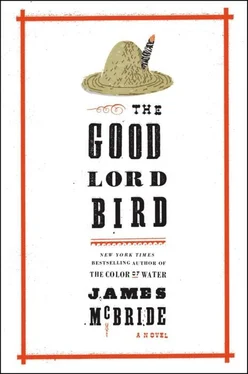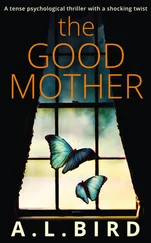We wagoneered up to Chatham, Ontario, the men in the back while the Old Man and I rode up front. He was cheerful all the way, allowing that we was heading to a special meeting. “It’s the first of its type,” he announced. “A convention with Negroes from all over America and Canada is hiving to make a resolution against slavery. The war begins in earnest, Onion. We will have numbers. We will have resolution. We will have revolution ! It’s percolating! ”
It didn’t percolate right off. Only forty-five folks percolated to Chatham, and of that number, nearly a third was the white fellers from the Old Man’s army or was white fellers who picked up and joined us along the way. It was January, cold and snowy, and on account of that or whatever other duties kept them free Negroes home, it was as pitiful a convention as I ever did see. It was held in an old Masons’ lodge in a single day, with lots of speeches and resolving and herebys and halooting ’bout this and that and not a bite to eat; a bunch of them fellers read declarations the Old Man had written up, and there was a lot of hollering ’bout who shot John and what the slave needed to do to prosper and get clear of the white man. There weren’t nothing too good for encouragement in the whole deal from what I could see. Even the Old Man’s pal Mr. Douglass didn’t come, and that made the Old Man’s feathers fall some.
“Frederick never plans well,” he said airily, “and he will regret the lack of planning that caused him to miss one of the great moments in American history. There is great speakers and great minds present here. We is changing the course of this country as we speak, Onion.”
Course, being that he was the main appointed speaker and wrote the constitution and set the bylaws and basically done the whole thing himself, that helped make the thing in his mind seem more important. It was all ’bout him, him, and him. Nobody in America could outdo John Brown when it come to tooting his own whistle. He let the Negroes have their moments, course, and after they blowed out more hot gas and done more grousing ’bout the white man and slavery in that one day than I was to hear in the next thirty years, it was his turn. It was the end of the day, and they had speechified and signed papers and made resolutions and the like, and it was the Old Man’s turn to speak and show his papers and froth his mouth ’bout the whole slavery show. I was dead tired and hungry by then, course, having had nothing to eat being around him as usual, but he was the main event, and that being so, they was all licking their chops for him when he shuffled to the front of the room fluffling his papers, while the room lay quiet, full of expectation.
He wore a string tie for the occasion, and sewed three new buttons on his tattered suit, of which they was all different-colored buttons, but for him that was sporty. He stood upon the old rostrum, cleared his throat, then declared, “The day of the Negro’s victory is at hand.” And off he went. I ought to say here that these wasn’t no ordinary Negroes the Old Man was talking with. These Negroes were upper crust. They wore bow ties and bowler caps. They had all their teeth. Their hair was clipped clean. They was schoolteachers and ministers and doctors; shaved men who knowed their letters, and, by God, the Old Man roused these sporty, free, highfalutin, big-time Negroes till they was ready to roast corn and eat earworms in his favor. He raised the rafters on that old lodge house. He had them Negroes bellowing like sheep. When he harped ’bout destroying the white man’s slave yard, they hollered, “Yes!” When he railed ’bout taking the revolution to the white man, they screamed, “We is all for it!” When he honked on ’bout busting them slaves loose by force, they piped out, “Let us begin!” But when he quit his speech and held up a paper asking for volunteers to come up and sign on in his war against slavery, not a man stepped forward nor raised his hand. The room was quiet as a cotton sack.
Finally a feller in the back stood up.
“We is all for your war on slavery,” he said, “but would like to know what your specific plan is.”
“I can’t announce it,” the Old Man grumbled. “There might be spies among us. But I can tell you, it ain’t a peaceable march using moral suasion.”
“What’s that mean?”
“I aim to purge America’s sin with blood. And I will do it soon. With the help of the Negro people.”
That curdled my cheese right there, and I decided Canada is where I would stay. I had my pantaloons, shirt, and shoes hidden away, plus a few pennies I’d managed to save up from our Yankee fund-raising. I figured with all them high-siddity niggers in the room, there must be at least one or two kindhearted souls among ’em who would help me get started out new again, maybe tender me some shelter and a bit to eat till I got going enough to pull up my own knickers.
A slim feller with long sideburns and a smock coat near the front of the room stood up. “I allows that is plan enough for me,” the feller said. “I will join up.” His name was O. P. Anderson. A braver soul you will not meet. But I’ll get to O.P. in a minute.
Next the Old Man looked around the room and asked, “Is there anyone else?”
Not a soul stirred.
Finally another feller spoke out. “If you will just tell a little of your battle plan, Captain, then I will join. I can’t sign a contract knowing what kind of dangers is ahead.”
“I ain’t asking you to trot ’round a circle like a horse. Is you wanting to save your people or not?”
“That’s just it. They’re my people.”
“No they’re not. They’re God’s people.”
That started some wrangling and conniption, with some arguing this way and that, some with the Old Man, others against. Finally the first feller who started the ruckus said, “I ain’t afraid, Captain. I escaped slavery and run three thousand miles here on foot and horseback. But I hold my life dear. And if I’m to lose it fighting slavery, I would like to know the manner in which it is to happen.”
Several others agreed with him, and allowed they’d join, too, if the Old Man would simply reveal his plan—where it would happen, when, what was the strategy, and so forth. But the Old Man was stubborn on that count, and wouldn’t turn. They pressed him on it.
“Why is you holding back?” one said.
“Is there a catch?” said another.
“It’s a secret conference, Captain! Ain’t nobody gonna tell!”
“We don’t know you!” somebody hollered. “Who are you? Why should we trust you? You is white, and got nothing to lose, whereas we stand to lose everything.”
That got him, and the Old Man firmed up, he got mad, for his voice thinned out and his eyes growed steady and cold, which they did in them times. “I has proven over the course of my life that I am a man of my word,” he said. “I am a friend of the Negro and I move to God’s purpose. If I say I am planning a war to end slavery, that is word enough. This war will begin here but not end here. It will go on whether you join it or not. You have to meet your Maker just as I do. So go ahead: Work out on your own what you chooses to tell Him when your time to meet Him comes. I only ask”—and here he glared ’bout the room—“that whatever you do, tell no one about what you’ve heard here.”
He looked ’bout the room. Not a soul spoke out. He nodded. “Since there is no one else signing on, our business is done. Therefore, as president of this here body and author of this here constitution, I hereby move to close this—”
“Hold a minute, Captain.” Here a voice come from the back of the room.
Every head turned to see a woman. She was the only woman in the room besides yours truly, who don’t count. She was a short, slender number. She wore her hair under a wrap and a simple maid’s dress and apron. Her feet was covered by a pair of man’s boots. She dressed like a slave, except for a colorful shawl, beaten and worn, which she carried across her arm. She had a quiet manner ’bout her, she weren’t a talker, you could see that, but her eyes was dark and boiling. She moved toward the front of the room like the wind, quick, silent, smooth, taut as rope, and them fellers parted and slid their benches out the way to let her pass. There was something fearful ’bout that woman, silent, terrible, and strong, and I made up my mind to keep away from her right off. I had good practice being a girl by then. But colored women could sniff out my true nature better than most, and something told me that a powerful-looking woman like that could not be fooled with nor did she fool easily. She slipped to the front of the room with her hands folded in across her chest and faced the men. If you passed by the window of that old lodge and peeked inside, you’d’a thunk a cleaning woman was addressing a room full of professors, explaining to them why she hadn’t cleaned the privy or some such thing, for the men was dressed in suits, hats, and bow ties—whereas she was dressed like a simple slave.
Читать дальше












